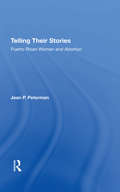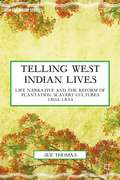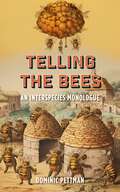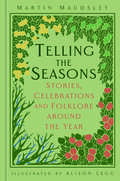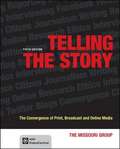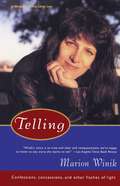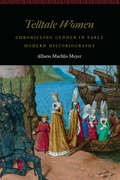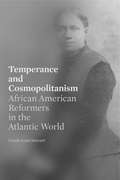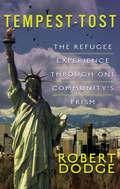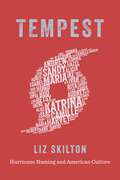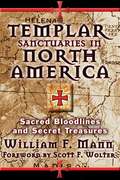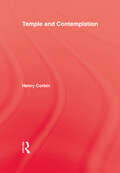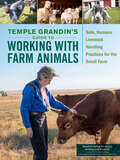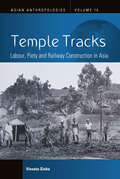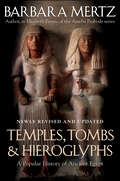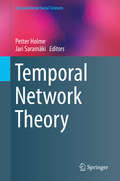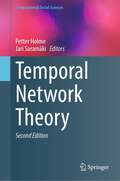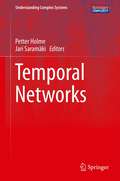- Table View
- List View
Telling Their Stories: Puerto Rican Women And Abortion
by Jean PetermanAbortion and the right of a woman to control her fertility cross boundaries of race, ethnicity, and social class. In this revealing and in-depth study, Jean P. Peterman focuses on a group of Puerto Rican women in Chicago whose decisions about abortion highlight the contradictions between the sexually conservative ethnic and religious beliefs of this community and the fact that Latina women (including Puerto Rican women) have abortions at a rate one and a half times as high as non-Latinas. For more than half the women Peterman interviewed, their decision to have an abortion allowed them to maintain opportunities for themselves or to resist male control. Despite their resistance to traditional gender roles, their Puerto Rican identity remains strong. The term “cultural story,†coined by sociologist Laurel Richardson, explains how cultures create and support their social worlds—their cultural and social frameworks as well as beliefs about home, community, sex roles, and family. A “collective story†is an oppositional story—a form of resistance and a catalyst for change. In this book, the stories recounted by these women involve struggles against barriers instrinsic to their social structure, such as poverty, prejudice, and discrimination, that ultimately shape newfound feelings of independence, inner strength, and control over their own fertility and their lives.
Telling West Indian Lives: Life Narrative and the Reform of Plantation Slavery Cultures 1804–1834 (New Caribbean Studies)
by S. ThomasTelling West Indian Lives: Life Narrative and the Reform of Plantation Slavery Cultures 1804-1834 draws historical and literary attention to life story and narration in the late plantation slavery period. Drawing on new archival research, it highlights the ways written narrative shaped evangelical, philanthropic, and antislavery reform projects.
Telling it to the Judge
by Arthur J. RayArthur Ray's extensive knowledge in the history of the fur trade and Native economic history brought him into the courts as an expert witness in the mid-1980s. For over twenty-five years he has been a part of landmark litigation concerning treaty rights, Aboriginal title, and Métis rights. In Telling It to the Judge, Ray recalls lengthy courtroom battles over lines of evidence, historical interpretation, and philosophies of history, reflecting on the problems inherent in teaching history in the adversarial courtroom setting. Told with charm and based on extensive experience, Telling It to the Judge is a unique narrative of courtroom strategy in the effort to obtain constitutional recognition of Aboriginal and treaty rights.
Telling it to the Judge: Taking Native History to Court (McGill-Queen's Indigenous and Northern Studies #65)
by Arthur J. RayArthur Ray's extensive knowledge in the history of the fur trade and Native economic history brought him into the courts as an expert witness in the mid-1980s. For over twenty-five years he has been a part of landmark litigation concerning treaty rights, Aboriginal title, and Métis rights. In Telling It to the Judge, Ray recalls lengthy courtroom battles over lines of evidence, historical interpretation, and philosophies of history, reflecting on the problems inherent in teaching history in the adversarial courtroom setting. Told with charm and based on extensive experience, Telling It to the Judge is a unique narrative of courtroom strategy in the effort to obtain constitutional recognition of Aboriginal and treaty rights.
Telling the Bees: An Interspecies Monologue
by Dominic PettmanIn a bid to wean himself off Facebook and Twitter, media scholar and cultural theorist Dominic Pettman decided to revive an ancient custom. He decided to tell the local bees of his thoughts, theories, musings, and meditations. The result was an apian journal that parses the daily news and the routines of modern life in a more sustained and reflective way than the Pavlovian posts to which we are so addicted.The account that emerges from Pettman’s regular discussion with the bees forms a compelling portrait of the tumultuous period running from the Fall of 2019 to New Year’s Eve, 2022. What began as a reflection on the traumatic effects of an “unprecedented” presidency soon evolved into a real-time response to the equally extraordinary events of the pandemic and its aftermath. One key concern that emerges from Pettman’s ongoing discussion with the bees is the extent to which, thanks to the alienating effects of neoliberalism, we were already engaged in an advanced form of social distancing long before anyone had heard of COVID. Other key themes include education, human-animal relations, climate change, mediated intimacy, attention ecologies, collective memory, slow violence, the self-fulfilling prophecy that is New York City, the never-ending end of history, and the mundane strategies we share in a bid to forge on, despite the accumulating challenges of the twenty-first century. Telling the Bees is an invitation to rediscover the art of reflection and a profound meditation on human connection, alienation, and our collective yearning for intimacy in an age of distance. Through what Pettman describes as an "interspecies monologue," readers are treated to a unique perspective on navigating the complexities of the twenty-first century, inspired by the ingenuity and resilience of our natural cohabitants.
Telling the Seasons: Stories, Celebrations and Folklore around the Year
by Martin MaudsleyTelling the Seasons takes us on a journey through the twelve months of the year with stories, customs and celebrations. Drawing on the changing patterns of nature and the rich tapestry of folklore from the British Isles, it is a colourful guide into how and why we continue to celebrate the seasons.Here are magical myths of the sun and moon, earthy tales of walking stones and talking trees and lively legends of the spirits of each season. Original drawings, sayings, songs, recipes and rhymes, combine into a ‘spell-book’ of the seasons. Martin Maudsley tells tales around the year to children and adults, specialising in stories of the natural world and local landscapes. He can be found leading seasonal celebrations from firelit winter wassails to bright May Day mornings in rural Dorset where he lives.
Telling the Story: The Convergence of Print, Broadcast and Online Media (5th Edition)
by Brian S. Brooks George Kennedy Daryl R. Moen Don RanlyThe way journalists work and how the public gets its news have changed dramatically. The media landscape has evolved and converged, and to succeed, journalism students must learn the fundamentals of journalism -- how to research, write, and tell a great story -- and use these skills in an increasingly digital world. The Missouri Group continues to offer the best coverage of the basics while keeping pace with the trends in the field. In Telling the Story, 5th edition, The Missouri Group goes even further with concise, how-to coverage of the new journalistic skills that take advantage of new technologies -- from blogging to researching online, to using social media and conducting online interviews.
Telling to Live: Latina Feminist Testimonios
by Ruth Behar Luz del Alba Acevedo Norma Alarcón Celia Alvarez Rina Benmayor Norma E. Cantú Daisy Cocco De Filippis Gloria Holguín Cuádraz Liza Fiol-Matta Yvette Gisele Flores-Ortiz Inés Hernández-Avila Aurora Levins Morales Clara Lomas Iris Ofelia López Mirtha N. Quintanales Eliana Rivero Caridad Souza Patricia ZavellaTelling to Live embodies the vision that compelled Latina feminists to engage their differences and find common ground. Its contributors reflect varied class, religious, ethnic, racial, linguistic, sexual, and national backgrounds. Yet in one way or another they are all professional producers of testimonios--or life stories--whether as poets, oral historians, literary scholars, ethnographers, or psychologists. Through coalitional politics, these women have forged feminist political stances about generating knowledge through experience. Reclaiming testimonio as a tool for understanding the complexities of Latina identity, they compare how each made the journey to become credentialed creative thinkers and writers. Telling to Live unleashes the clarifying power of sharing these stories. The complex and rich tapestry of narratives that comprises this book introduces us to an intergenerational group of Latina women who negotiate their place in U. S. society at the cusp of the twenty-first century. These are the stories of women who struggled to reach the echelons of higher education, often against great odds, and constructed relationships of sustenance and creativity along the way. The stories, poetry, memoirs, and reflections of this diverse group of Puerto Rican, Chicana, Native American, Mexican, Cuban, Dominican, Sephardic, mixed-heritage, and Central American women provide new perspectives on feminist theorizing, perspectives located in the borderlands of Latino cultures. This often heart wrenching, sometimes playful, yet always insightful collection will interest those who wish to understand the challenges U. S. society poses for women of complex cultural heritages who strive to carve out their own spaces in the ivory tower. Contributors. Luz del Alba Acevedo, Norma Alarcn, Celia Alvarez, Ruth Behar, Rina Benmayor, Norma E. Cant, Daisy Cocco De Filippis, Gloria Holgun Cudraz, Liza Fiol-Matta, Yvette Flores-Ortiz, Ins Hernndez-Avila, Aurora Levins Morales, Clara Lomas, Iris Ofelia Lpez, Mirtha N. Quintanales, Eliana Rivero, Caridad Souza, Patricia Zavella
Telling: Confessions, Concessions, and Other Flashes of Light
by Marion WinikCombining the insight of Anna Quindlen and the comic storytelling of Garrison Keillor with her own singularly outrageous humor, Marion Winik has captivated thousands of listeners on NPR's All Things Considered. Now, in Telling, she takes us on a journey both personal and universal, a tour of the minefield of chance and circumstance that make up a life. Along the way, she offers razor-sharp takes on everything from adolescence in suburban New Jersey ("Yes, I wanted to be a wild teenage rebel, but I wanted to do it with my parents' blessing") to hellish houseguests and bad-news boyfriends; from the joys of breastfeeding in public to the sometimes-salvation of motherhood. Candid, passionate, and breathtakingly funny, Marion Winik maintains an unshaken belief that following one's heart is more important than following the rules -- and a conviction that the secrets we try to hide often contain the deepest truths. "A born iconoclast, an aspiring artiste, a feminist vegetarian prodigal daughter, from early youth I considered myself destined to lead a startling life far outside the bounds of convention. I would be famous, dangerous, brilliant and relentlessly cool: a sort of cross between Emma Goldman, Jack Kerouac, and Georgia O'Keeffe. . . . So where did this station wagon come from?"
Telltale Women: Chronicling Gender in Early Modern Historiography (Women and Gender in the Early Modern World)
by Allison Machlis MeyerTelltale Women fundamentally reimagines the relationship between the history play and its source material as an intertextual one, presenting evidence for a new narrative about how—and why—these genres disparately chronicle the histories of royal women. Allison Machlis Meyer challenges established perceptions of source study, historiography, and the staging of gender politics in well-known drama by arguing that chronicles and political histories frequently value women&’s political interventions and use narrative techniques to invest their voices with authority. Dramatists who used these sources for their history plays thus encountered a historical record that offered surprisingly ample precedents for depicting women&’s perspectives and political influence as legitimate, and writers for the commercial theater grappled with such precedents by reshaping source material to create stage representations of royal women that condemned queenship and female power. By tracing how the sanctioning of women&’s political participation changes from the narrative page to the dramatic stage, Meyer demonstrates that gender politics in both canonical and noncanonical history plays emerge from playwrights&’ intertextual engagements with a rich alternative view of women in the narrative historiography of the sixteenth and seventeenth centuries.
Temperance and Cosmopolitanism: African American Reformers in the Atlantic World (Africana Religions #1)
by Carole Lynn StewartTemperance and Cosmopolitanism explores the nature and meaning of cosmopolitan freedom in the nineteenth century through a study of selected African American authors and reformers: William Wells Brown, Martin Delany, George Moses Horton, Frances E. W. Harper, and Amanda Berry Smith. Their voluntary travels, a reversal of the involuntary movement of enslavement, form the basis for a critical mode of cosmopolitan freedom rooted in temperance. Both before and after the Civil War, white Americans often associated alcohol and drugs with blackness and enslavement. Carole Lynn Stewart traces how African American reformers mobilized the discourses of cosmopolitanism and restraint to expand the meaning of freedom—a freedom that draws on themes of abolitionism and temperance not only as principles and practices for the inner life but simultaneously as the ordering structures for forms of culture and society. While investigating traditional meanings of temperance consistent with the ethos of the Protestant work ethic, Enlightenment rationality, or asceticism, Stewart shows how temperance informed the founding of diasporic communities and civil societies to heal those who had been affected by the pursuit of excess in the transatlantic slave trade and the individualist pursuit of happiness. By elucidating the concept of the “black Atlantic” through the lenses of literary reformers, Temperance and Cosmopolitanism challenges the narrative of Atlantic history, empire, and European elite cosmopolitanism. Its interdisciplinary approach will be of particular value to scholars of African American literature and history as well as scholars of nineteenth-century cultural, political, and religious studies.
Temperance and Cosmopolitanism: African American Reformers in the Atlantic World (Africana Religions)
by Carole Lynn StewartTemperance and Cosmopolitanism explores the nature and meaning of cosmopolitan freedom in the nineteenth century through a study of selected African American authors and reformers: William Wells Brown, Martin Delany, George Moses Horton, Frances E. W. Harper, and Amanda Berry Smith. Their voluntary travels, a reversal of the involuntary movement of enslavement, form the basis for a critical mode of cosmopolitan freedom rooted in temperance. Both before and after the Civil War, white Americans often associated alcohol and drugs with blackness and enslavement. Carole Lynn Stewart traces how African American reformers mobilized the discourses of cosmopolitanism and restraint to expand the meaning of freedom—a freedom that draws on themes of abolitionism and temperance not only as principles and practices for the inner life but simultaneously as the ordering structures for forms of culture and society. While investigating traditional meanings of temperance consistent with the ethos of the Protestant work ethic, Enlightenment rationality, or asceticism, Stewart shows how temperance informed the founding of diasporic communities and civil societies to heal those who had been affected by the pursuit of excess in the transatlantic slave trade and the individualist pursuit of happiness. By elucidating the concept of the “black Atlantic” through the lenses of literary reformers, Temperance and Cosmopolitanism challenges the narrative of Atlantic history, empire, and European elite cosmopolitanism. Its interdisciplinary approach will be of particular value to scholars of African American literature and history as well as scholars of nineteenth-century cultural, political, and religious studies.
Temperate Forest Biomes (Greenwood Guides to Biomes of the World)
by Bernd H. KuenneckeThe tropical forests my provide much of our oxygen world-wide, but the temperate forests sustain us, and here Kuennecke (Radford U.) takes a very close look at temperate forest biomes, temperate broadleaf deciduous forests, Mediterranean woodlands and stands of scrub in a temperate environment. Focusing on a range of temperate forest biomes, he gives a general overview at a global scale and analyzes specific biomes in detail, so much so that chapters can stand on their own. He keeps undergraduates in mind, using a minimum of scientific jargon but respecting that which is needed, and organizes chapters geographically to cover virtually every temperate biome. He notes that all biomes overlap to some degree and explains the phenomenon, and also pays attention to the effects of climate and climate change. Annotation ©2009 Book News, Inc., Portland, OR (booknews.com)
Tempest-Tost: The Refugee Experience Through One Community's Prism
by Robert Dodge&“Dodge takes us behind the headlines and introduces real people and their very real struggles yearning to breathe free. Page-turning [and] proactive.&” —Craig McGuire, author of Brooklyn&’s Most Wanted Kahassai fled the Ethiopian Red Terror that killed his father and hundreds of thousands of others, trekking through a snake-infested jungle while hyenas followed him at night. Georgette crossed the Congo while the Hutus and Tutsis struggled for control as millions of defenseless people were murdered and displaced. Asmi and Leela were children in Bhutan when soldiers burned their villages and drove out the Nepalese-speaking Hindus. Roy narrowly escaped Afghanistan after the Americans began bombing Kabul to drive out the Taliban. Mahn made it out of Vietnam only after his twenty-second attempt. Mohammed survived daily beatings when imprisoned in Syria, though many of his fellow prisoners died. What do these people have in common beyond tales of horror and hardship that caused them to flee their countries, leaving their homes, families, and previous lives behind? They all found a new place to live in Denver, Colorado, the &“Queen City of the Plains.&” In this timely and important book, author Robert Dodge describes the circumstances that caused these refugees to flee their homes and shares their experiences after they arrived in Denver. This is the refugee story behind the headlines and political posturing. This is what coming to America has meant to those displaced, as represented by various refugee communities that over the years have come to think of Denver, Colorado as home.
Tempest: Hurricane Naming and American Culture (The Natural World of the Gulf South)
by Liz SkiltonLiz Skilton’s innovative study tracks the naming of hurricanes over six decades, exploring the interplay between naming practice and wider American culture. In 1953, the U.S. Weather Bureau adopted female names to identify hurricanes and other tropical storms. Within two years, that convention came into question, and by 1978 a new system was introduced, including alternating male and female names in a pattern that continues today. In Tempest: Hurricane Naming and American Culture, Skilton blends gender studies with environmental history to analyze this often controversial tradition. Focusing on the Gulf South—the nation’s “hurricane coast”—Skilton closely examines select storms, including Betsy, Camille, Andrew, Katrina, and Harvey, while referencing dozens of others. Through print and online media sources, government reports, scientific data, and ephemera, she reveals how language and images portray hurricanes as gendered objects: masculine-named storms are generally characterized as stronger and more serious, while feminine-named storms are described as “unladylike” and in need of taming. Further, Skilton shows how the hypersexualized rhetoric surrounding Katrina and Sandy and the effeminate depictions of Georges represent evolving methods to define and explain extreme weather events. As she chronicles the evolution of gendered storm naming in the United States, Skilton delves into many other aspects of hurricane history. She describes attempts at scientific control of storms through hurricane seeding during the Cold War arms race of the 1950s and relates how Roxcy Bolton, a member of the National Organization for Women, led the crusade against feminizing hurricanes from her home in Miami near the National Hurricane Center in the 1970s. Skilton also discusses the skyrocketing interest in extreme weather events that accompanied the introduction of 24-hour news coverage of storms, as well as the impact of social media networks on Americans’ tracking and understanding of hurricanes and other disasters. The debate over hurricane naming continues, as Skilton demonstrates, and many Americans question the merit and purpose of the gendered naming system. What is clear is that hurricane names matter, and that they fundamentally shape our impressions of storms, for good and bad.
Templar Heresy: A Story of Gnostic Illumination
by James Wasserman Harvey Rochman Keith StumpA tale of initiation, adventure, and romance set within the medieval Crusades• Shares in novel form the mystical rituals and techniques of the Nizari Ismailis (the legendary Assassins) communicated to selected Knights Templar during the Crusades• Shows how the Gnostic traditions of the Cathars and Nizaris were blended to become the core of the “heretical” doctrines for which the Templars were later condemned• Sheds light on the contemporary conflict between Islam and the West and offers a natural path of reconciliation between these disparate culturesSet within the dramatic tableau of the medieval Crusades, this story of initiation, adventure, and romance follows members of the Knights Templar and Assassins as they discover a mystical tradition with the potential to unify, protect, and liberate humankind--the very heresy for which the Knights Templar were later condemned.The tale begins with a young Persian student, Sinan, as he witnesses his teacher deliver the heretical Qiyama proclamation, seeking to abolish Islamic religious law in favor of a more mystical approach to spirituality. After completing his initiation into the revolutionary doctrines and practices of the Assassins--also known as the Nizari Ismailis or Hashishim--Sinan is appointed head of the Nizaris in Syria. Years later, after Sinan has become a wise and respected leader, he encounters Roland de Provence, a young member of the Knights Templar. Impressed by his courage and intelligence, Sinan selects him for initiation into the Nizari tradition. As readers follow Sinan and Roland through the process, they experience firsthand the transmission of these secret teachings and the paranormal, even magical powers of the Assassin adepts. Roland braves hashish journeys, mystical rituals, and divine epiphanies, as well as sexual awakening at the hands of Sinan’s beautiful consort Aisha. When Roland completes his education with Sinan, he vows to share the Nizari teachings with his fellow Templars. However, he is met with strong opposition from his Templar commander, and factions within the Order quickly arise. As we follow Roland to southern France, we witness how he blends the Cathar and Nizari traditions to form the core of the “heresy” for which the Templars were later arrested and condemned. Now an outlaw, hunted by his Templar brethren, Roland is forced to choose between the beliefs with which he was raised and the realizations of his own personal truths.Bringing to life the historical truths of his expertly researched bestseller The Templars and the Assassins, James Wasserman artfully traces the evolution of the Western Esoteric Tradition during the fertile cultural interactions of the Crusades. His story also sheds light on the modern conflict between Islam and the West--which began a thousand years ago--and offers a natural path of reconciliation between our disparate cultures.
Templar Sanctuaries in North America: Sacred Bloodlines and Secret Treasures
by William F. Mann Scott F. WolterTraces the movement of the Templars’ secret treasure across North America to where it still resides, protected by a sacred lineage of guardians• Explains how the Templars found refuge with Native American tribes, intermarrying with the Natives to continue the Holy Bloodline and further the lineage of guardians needed to protect their treasure and secrets• Reveals new evidence for the existence of Templar settlements and monuments across North America and how these reactivate the continent’s sacred rose lines• Pinpoints the exact location of the Templar/Holy Bloodline treasureMany have searched for the lost treasure of the Knights Templar, most famously at Oak Island. But what if the treasure wasn’t lost? What if this treasure--necessary to sanctify the Temple of Solomon and create a New Jerusalem--was moved through the centuries and protected by a sacred lineage of guardians, descendants of Prince Henry Sinclair and the Native American tribes who helped him?Drawing on his access as Grand Archivist of the Knights Templar of Canada and his own role as a descendant of both Sinclair and the Anishinabe/Algonquin tribe, William Mann examines new evidence of the Knights Templar in the New World long before Columbus and their mission to protect the Holy Bloodline of Jesus and Mary Magdalene. He reveals the secret settlements they built as they moved westward across the vast wilderness of North America, evading the European Church and Royal Houses. He explains how the Templars found refuge in the Sacred Medicine Lodges of the Algonquins, whose ceremonies and rituals bear striking resemblance to the initiations of Freemasonry. He reveals the strategic intermarriages that took place between the Natives and the Templars, furthering the Holy Bloodline and continuing the lineage of blood-guardians. The author explores how Sinclair’s journey from Nova Scotia across America also served to reactivate the sacred rose lines of North America through the building of “rose castles” and monuments, including the Newport Tower and the Kensington Rune Stone. Pinpointing the exact location of the Templar treasure still hidden in North America, the author also reveals the search for Templar sanctuaries to be the chief motivation behind the Lewis and Clark expedition and the murder of Meriwether Lewis.
Temple & Contemplation
by CorbinFirst published in 1986. Routledge is an imprint of Taylor & Francis, an informa company.
Temple Grandin's Guide to Working with Farm Animals: Safe, Humane Livestock Handling Practices for the Small Farm
by Temple GrandinAward-winning author Temple Grandin is famous for her groundbreaking approach to decoding animal behavior. Now she extends her expert guidance to small-scale farming operations. Grandin&’s fascinating explanations of how herd animals think — describing their senses, fears, instincts, and memories — and how to analyze their behavior, will help you handle your livestock more safely and effectively. You&’ll learn to become a skilled observer of animal movement and behavior, and detailed illustrations will help you set up simple and efficient facilities for managing a small herd of 3 to 25 cattle or pigs, or 5 to 100 goats or sheep.
Temple Tracks: Labour, Piety and Railway Construction in Asia (Asian Anthropologies #16)
by Vineeta SinhaThe notions of labour, mobility and piety have a complex and intertwined relationship. Using ethnographic methods and a historical perspective, Temple Tracks critically outlines the interlink of railway construction in colonial and post-colonial Asia, as well as the anthropology of infrastructure and transnational mobilities with religion. In Malaysia and Singapore, evidence of religion-making and railway-building from a colonial past is visible in multiple modes and media as memories, recollections and ‘traces’.
Temples, Tombs, & Hieroglyphs: A Popular History of Ancient Egypt
by Barbara MertzWorld-renowned Egyptologist Barbara Mertz explores the reality behind the bestselling fiction she writes (as Elizabeth Peters) and casts a dazzling light on a remarkable civilization.Afascinating chronicle of an extraordinary people—from the first Stone Age settlements through the reign of Cleopatra and the Roman invasions—Temples, Tombs, and Hieroglyphs brings ancient Egypt to life as never before. Lavishly illustrated with pictures, maps, and photographs, it offers tantalizing glimpses into Egyptian society; amazing stories of the pharaohs and the rise and fall of great dynasties; a sampling of culture, religion, and folklore; stories of explorers, scientists, and scoundrels who sought to unravel or exploit the ageless mysteries; and new insights into the architectural wonders that were raised along the banks of the Nile.
Temporal Identities and Security Policy in Postwar Japan (European Institute of Japanese Studies East Asian Economics and Business Series)
by Ulv HanssenThrough a discourse analysis of Japanese parliamentary debates, this book explores how different understandings of Japan’s history have led to sharply divergent security policies in the postwar period, whilst providing an explanation for the much-debated security policy changes under Abe Shinzō. Analyzing the ways identities can be constructed through ‘temporal othering,’ as well as ‘spatial othering,’ this book examines the rise of a new form of identity in Japan since the end of the Cold War, one that is differentiated not from prewar and wartime Japan, but from postwar Japan. The champions of this identity, it argues, see the postwar past as a shameful period, characterized by self-imposed military restrictions, and thus the relentless chipping away of these limitations in recent years is indicative of how dominant this identity has become. Exploring how these military restrictions have shifted from being a symbol of pride to a symbol of shame, this book demonstrates the concrete ways in which the past can both enable and constrain policy. Temporal Identities and Security Policy in Postwar Japan will be invaluable to students and scholars of Japanese politics and foreign policy, as well as international relations more generally.
Temporal Network Theory (Computational Social Sciences)
by Jari Saramäki Petter HolmeThis book focuses on the theoretical side of temporal network research and gives an overview of the state of the art in the field. Curated by two pioneers in the field who have helped to shape it, the book contains contributions from many leading researchers. Temporal networks fill the border area between network science and time-series analysis and are relevant for the modeling of epidemics, optimization of transportation and logistics, as well as understanding biological phenomena. Network theory has proven, over the past 20 years to be one of the most powerful tools for the study and analysis of complex systems. Temporal network theory is perhaps the most recent significant development in the field in recent years, with direct applications to many of the "big data" sets. This monograph will appeal to students, researchers and professionals alike interested in theory and temporal networks, a field that has grown tremendously over the last decade.
Temporal Network Theory (Computational Social Sciences)
by Jari Saramäki Petter HolmeThis book focuses on the theoretical side of temporal network research and gives an overview of the state of the art in the field. Curated by two pioneers in the field who have helped to shape it, the book contains contributions from many leading researchers. Temporal networks fill the border area between network science and time-series analysis and are relevant for epidemic modeling, optimization of transportation and logistics, as well as understanding biological phenomena. Over the past 20 years, network theory has proven to be one of the most powerful tools for studying and analyzing complex systems. Temporal network theory is perhaps the most recent significant development in the field in recent years, with direct applications to many of the “big data” sets. This book appeals to students, researchers, and professionals interested in theory and temporal networks—a field that has grown tremendously over the last decade. This second edition of Temporal Network Theory extends the first with three chapters highlighting recent developments in the interface with machine learning.
Temporal Networks
by Jari Saramäki Petter HolmeThe concept of temporal networks is an extension of complex networks as a modeling framework to include information on when interactions between nodes happen. Many studies of the last decade examine how the static network structure affect dynamic systems on the network. In this traditional approach the temporal aspects are pre-encoded in the dynamic system model. Temporal-network methods, on the other hand, lift the temporal information from the level of system dynamics to the mathematical representation of the contact network itself. This framework becomes particularly useful for cases where there is a lot of structure and heterogeneity both in the timings of interaction events and the network topology. The advantage compared to common static network approaches is the ability to design more accurate models in order to explain and predict large-scale dynamic phenomena (such as, e.g., epidemic outbreaks and other spreading phenomena). On the other hand, temporal network methods are mathematically and conceptually more challenging. This book is intended as a first introduction and state-of-the art overview of this rapidly emerging field.
